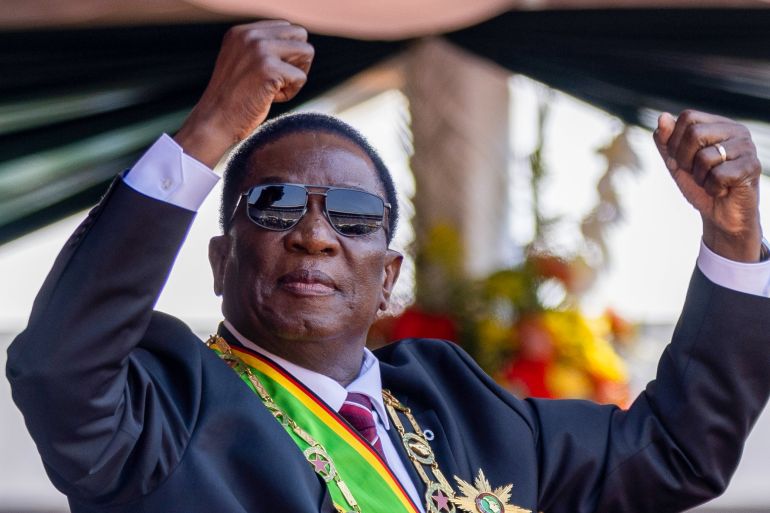US sanctions Zimbabwe President Emmerson Mnangagwa over alleged abuses
US targets Mnangagwa, his wife and top government officials in overhaul of sanctions regime imposed in 2003.

The United States has sanctioned Zimbabwe’s President Emmerson Mnangagwa, his wife and senior government officials for their alleged involvement in corruption and human rights abuses.
The US Treasury’s Office of Foreign Assets Control announced the sanctions – targeting three companies and 11 people, including the Mnangagwas, Vice President Constantino Chiwenga, and retired Brigadier-General Walter Tapfumaneyi – after a review of the sanctions programme that had been in place since 2003.
Keep reading
list of 4 items‘Structureless party’: Has Chamisa led Zimbabwe’s main opposition astray?
Zimbabwe nurses seek better conditions abroad but fear for patients at home
Eleven miners trapped after collapse of Zimbabwe mine
Other than the people listed on Monday, Zimbabweans formerly under US sanctions will see restrictions lifted.
“The changes we are making today are intended to make clear what has always been true: our sanctions are not intended to target the people of Zimbabwe,” Deputy Treasury Secretary Wally Adeyemo said.
“We are refocusing our sanctions on clear and specific targets: President Mnangagwa’s criminal network of government officials and businesspeople who are most responsible for corruption or human rights abuse against the people of Zimbabwe,” he said.
Mnangagwa is accused of protecting gold and diamond smugglers that operate in Zimbabwe and directing government officials to facilitate the sale of gold and diamonds in illicit markets and taking bribes in exchange for his services.
An Al Jazeera investigation last year found Zimbabwe’s government was using smuggling gangs to sell gold worth hundreds of millions of dollars, helping to mitigate the impact of sanctions. Gold is the country’s biggest export.
US Secretary of State Antony Blinken said the new measures were part of a “stronger, more targeted sanctions policy” on Zimbabwe and voiced concern over “serious cases of corruption and human rights abuse”.
“Key individuals, including members of the government of Zimbabwe, bear responsibility for these actions, including the looting of government coffers that robs Zimbabweans of public resources,” Blinken said in a statement.
“Multiple cases of abductions, physical abuse, and unlawful killing have left citizens living in fear.”
‘This is massive’
The earlier sanctions were imposed after a campaign of forced takeover of land from white farmers.
The Zimbabwean government welcomed those measures’ removal.
“Well, this is massive,” government spokesperson Nick Mangwana wrote on X, in what he called “a great vindication” of Mnangagwa’s foreign policy.
“That said, as long our president is under sanctions Zimbabwe remains under illegal sanctions, as long as members of the First Family are under sanctions, Zimbabwe remains under illegal sanctions, and as long as senior leadership is under sanctions, we are all under sanctions,” he added.
State Department spokesperson Matthew Miller quipped in response: “It’s rare that you see a government say that sanctions on the sitting president is a victory for the government.”
In Zimbabwe’s neighbour Zambia, President Hakainde Hichilema praised US President Joe Biden for ending the 2003 programme.
“This is further evidence that Pres. Biden listens to his African partners. We hope this is an opportunity for a new direction for Zimbabwe and regional engagement,” Hichilema wrote on X.
Mnangagwa, whose party has been in power for more than four decades, was declared the winner in elections last August that international observers said fell short of democratic standards.
Mnangagwa pushed an ailing Robert Mugabe out of office in 2017. Mugabe died two years later at the age of 95.